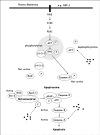Apoptotic effects of chrysin in human cancer cell lines
- PMID: 20559509
- PMCID: PMC2885101
- DOI: 10.3390/ijms11052188
Apoptotic effects of chrysin in human cancer cell lines
Abstract
Chrysin is a natural flavonoid currently under investigation due to its important biological anti-cancer properties. In most of the cancer cells tested, chrysin has shown to inhibit proliferation and induce apoptosis, and is more potent than other tested flavonoids in leukemia cells, where chrysin is likely to act via activation of caspases and inactivation of Akt signaling in the cells. Moreover, structure-activity relationships have revealed that the chemical structure of chrysin meets the key structural requirements of flavonoids for potent cytotoxicity in leukemia cells. It is possible that combination therapy or modified chrysin could be more potent than single-agent use or administration of unmodified chrysin. This study may help to develop ways of improving the effectiveness of chrysin in the treatment of leukemia and other human cancers in vitro.
Keywords: apoptotic effect; chrysin; human cancers; in vitro.
Figures


References
-
- Robards K, Antolovich M. Analytical chemistry of fruit bioflavonoids: A review. Analyst. 1997;122:11–34.
-
- Pietta PG. Flavonoids as anti-oxidants. J. Nat. Prod. 2000;63:1035–1042. - PubMed
-
- Nijveldt RJ, van Nood E, van Hoorn DE, Boelens PG, van Norren K, van Leeuwen PA. Flavonoids: A review of probable mechanisms of action and potential applications. Am. J. Clin. Nutr. 2001;74:418–425. - PubMed
-
- Kale A, Gawande S, Kotwal S. Cancer phytotherapeutics: role for flavonoids at the cellular level. Phytother. Res. 2008;22:567–577. - PubMed
-
- Awad R, Arnason JT, Trudeau V, Bergeron C, Budzinski JW, Foster BC, Merali Z. Phytochemical and biological analysis of skullcap (Scutellaria lateriflora L.): A medicinal plant with anxiolytic properties. Phytomedicine. 2003;10:640–649. - PubMed
Publication types
MeSH terms
Substances
LinkOut - more resources
Full Text Sources
Medical

